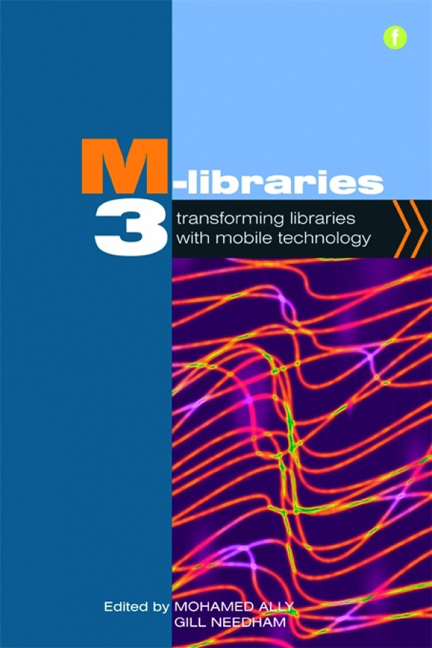Book contents
- Frontmatter
- Contents
- Acknowledgements
- Contributors
- Foreword
- Introduction
- 1 Education for all with mobile technology: the role of libraries
- PART 1 DEVELOPING MOBILE SERVICES
- 2 Preparing for the mobile world: experimenting with changing technologies and applications for library services
- 3 Enhancing open distance learning library services with mobile technologies
- 4 Use of mobile phones in the delivery of consumer health information
- 5 Deploying an e-reader loan service at an online university
- 6 Mobile service providers and library services in a multi-campus library
- 7 Using mobile technology to deliver information in audio format: learning by listening
- 8 Sound selection: podcasts prove positive
- PART 2 PEOPLE AND SKILLS
- PART 3 FOCUS ON TECHNOLOGY
- Conclusion
- Index
6 - Mobile service providers and library services in a multi-campus library
from PART 1 - DEVELOPING MOBILE SERVICES
Published online by Cambridge University Press: 08 June 2018
- Frontmatter
- Contents
- Acknowledgements
- Contributors
- Foreword
- Introduction
- 1 Education for all with mobile technology: the role of libraries
- PART 1 DEVELOPING MOBILE SERVICES
- 2 Preparing for the mobile world: experimenting with changing technologies and applications for library services
- 3 Enhancing open distance learning library services with mobile technologies
- 4 Use of mobile phones in the delivery of consumer health information
- 5 Deploying an e-reader loan service at an online university
- 6 Mobile service providers and library services in a multi-campus library
- 7 Using mobile technology to deliver information in audio format: learning by listening
- 8 Sound selection: podcasts prove positive
- PART 2 PEOPLE AND SKILLS
- PART 3 FOCUS ON TECHNOLOGY
- Conclusion
- Index
Summary
Introduction
Mobile technology has taken information and communication technology (ICT) around the world, the Pacific included, to greater heights. People with mobile technologies are able quickly to communicate, gather and share information without the limitations of time and place that once existed. The technology has revolutionized and even overwhelmed people's lives, altered the way normal business is done and may have increased expectations or fears of what lies in the future. While we are mapping out the best strategies for our ‘niches’, the mobile service providers are busy marketing their chosen products. The onus is on librarians, as information specialists, to embrace the new mobile technologies in their work and to make their demands known with regard to the use of mobile technology so as to address geographical areas where services are lacking.
This chapter attempts to address the mobile broadband and text service options offered by the two major service providers, Vodafone and Digicel, in Fiji, and highlights implications for the role of librarians in the Pacific. It begins with an overview of the region, the University, information technology and the library so that the diverse physical, economic, social and cultural dimensions that we must work with can be appreciated.
The Pacific region comprises 30 million square kilometres of ocean, making it three times greater than the area of Europe. The total land mass, however, is almost equal to that of Denmark. The region's territorial divisions are Melanesia, Polynesia and Micronesia and it is home to one-third of the world's languages. The total number of inhabitants is about 1.3 million, which is 0.1% of the world's population. Despite the varying degrees of diversity within the region, the introduction of mobile technologies has brought about changes in communication and also produced a current generation of information technology (IT) savvy clients, also referred to as ‘Net Gen’ users – a term coined by Oblinger and Oblinger (Lippincott, 2008) – a majority of whom are patrons of the University of South Pacific (USP) Library.
University of the South Pacific
Established in 1968, USP is one of only two universities of its kind in the world and is jointly owned by the governments of 12 Pacific island countries (Cook Islands, Fiji, Kiribati, Marshall Islands, Nauru, Niue, Samoa, Solomon Islands, Tokelau, Tonga, Tuvalu and Vanuatu).
- Type
- Chapter
- Information
- M-Libraries 3Transforming libraries with mobile technology, pp. 51 - 56Publisher: FacetPrint publication year: 2012



